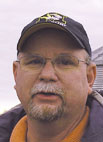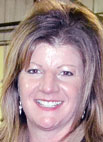
Although some people love trying out new restaurants and dishes, other people find their favorite eatery and stick with it. Then, these people tell their friends about the best place to eat, and pretty soon the restaurant becomes legendary. Sometimes, the successful restaurant opens branches at other locations, which in turn pleases even more satisfied customers. Nichols Farms operates in much the same manner.
Nichols Farms began in 1939 when Merrill and Gladys Nichols purchased 240 acres in Adair County, Iowa. By 1953 the couple and their sons David and Lee started a Purebred Angus herd. As the years went by, they also added Purebred Simmental cattle to the herd, and they began producing their famous “Composite” cattle. Nichols Farms developed a great reputation, and as they grew, they also expanded to more locations.
One of these locations is near Lamar, Mo. Local cattleman Darrell Kentner and Russ Massa raise their own cattle on their own land. In many ways, they are like hundreds of other producers in the area. The difference is that their herd is made up entirely of animals with the quality of Nichols genetics. Russ used the restaurant analogy to illustrate how their franchise operates. Though Russ and Darrell own and raise the cattle, their animals are of the same legendary quality animals as those grown by David Nichols at the original farm in Bridgewater, Iowa, or at their other independent franchises in North Carolina, Illinois or Wisconsin.
Nichols Farms began the revolutionary idea of franchising cattle in 1998, and by doing so, more producers have easy access to bulls with Nichols genetics. Russ and Darrell say that 90 percent of their bulls stay within 100 miles of Lamar. However, they have sold animals to producers as far away as Alabama, New York and Texas. Occasionally, they have even had tour groups stop to view their operations.
Groups come to see what research and development have done for the cattlemen. Nichols Farms has participated in studies with many different universities and extension services. Their research has produced bulls that sire calves that are born easily, have heavy weaning weights, show good feedlot gains, have high grades and yields and tend to sell higher. Part of their formula involves heterosis, or hybrid vigor. Russ said that the explosive energy of “heterosis is a freebie if you plan for it.”
Nichols Composite cattle result from crossing Purebred Simmentals and Purebred Angus. This is done to mix desirable characteristics, as well as increasing heterosis as much as possible. Though Darrell and Russ agree that they are not doing anything revolutionary, Nichols Farms has marketed their product aggressively and looked toward the future.
Darrell said, “We are making beef, not just raising cows.” He went on to say that as a producer he has to “look further down the line than just having a calf to load on the trailer.” He proves his point by the fact that all their animals are tested for breeding soundness before they are offered for sale.
All the bulls sold by Russ and Darrell have also been through a 100-day testing procedure. By the end of the test, Darrell said, “There is no such thing as a cull bull; every bull for sale is herd-sire quality.” Though there might be close to 100 bulls at their annual spring sale in March, those bulls represent the best their herd has to offer. Between Russ, Darrell, their partners Dean McKibben and Marty Bunton, and their co-operators, they have around 650 cows to choose from at breeding time, so the bulls that make it into the sale are the cream of the crop. They also consider themselves a bull supplier, so they try to have bulls to sell by private treaty year round.
Thanks to Russ and Darrell, producers can drive up to their operation and order a superior Nichols Farms bull as easy as going to their favorite restaurant.







